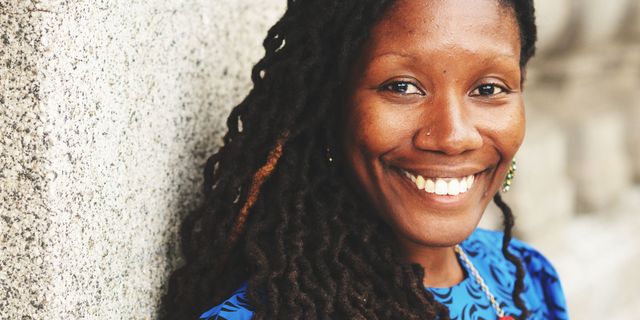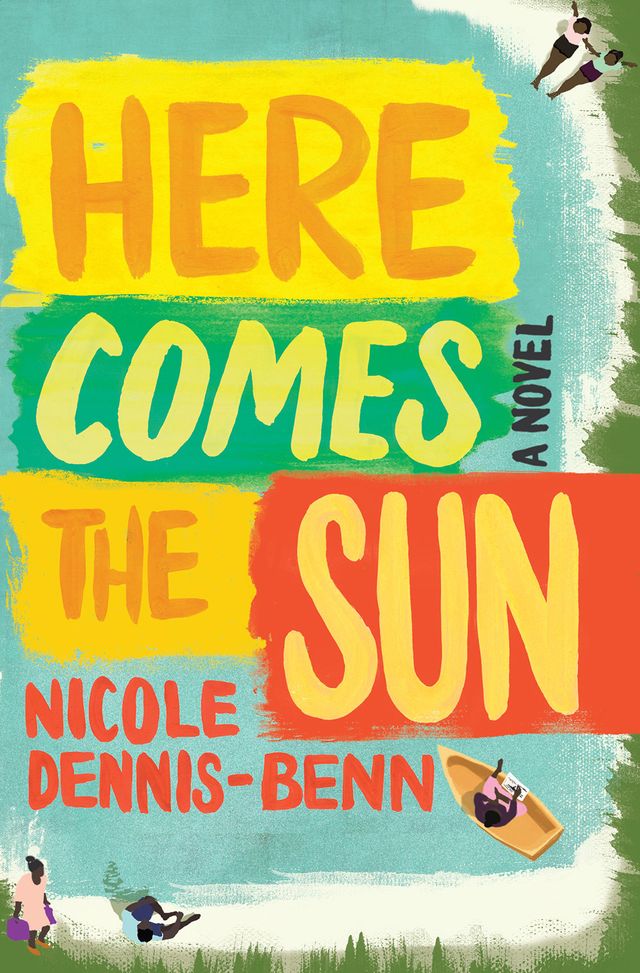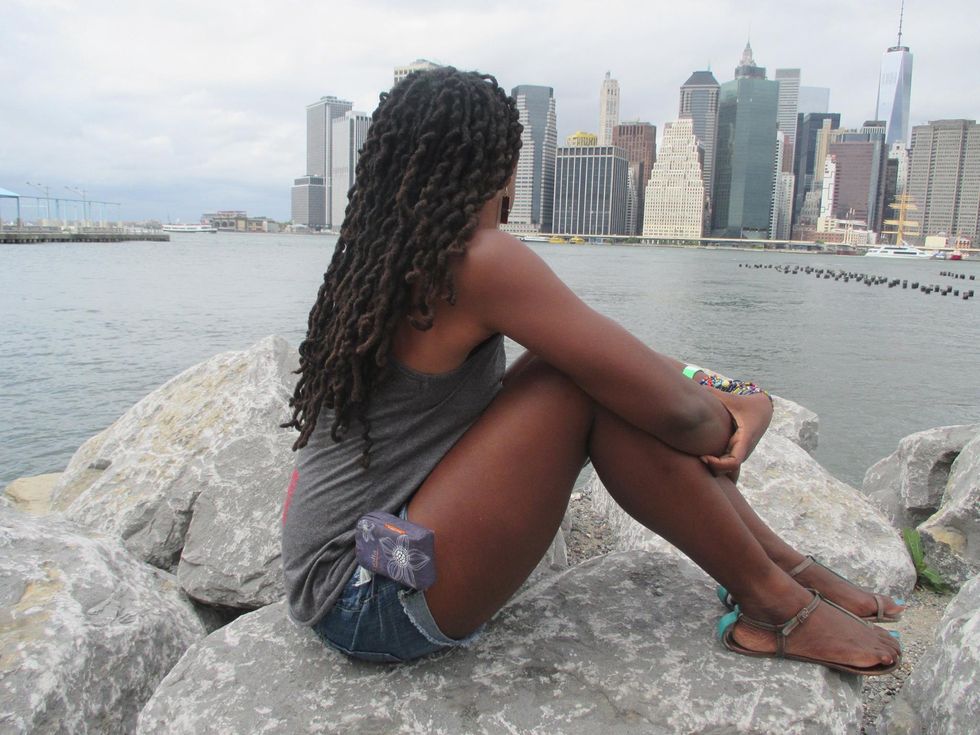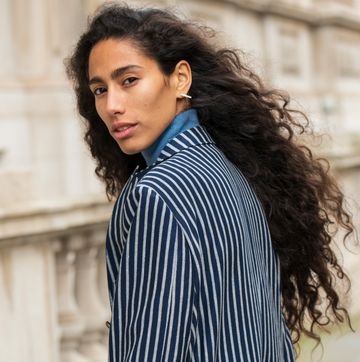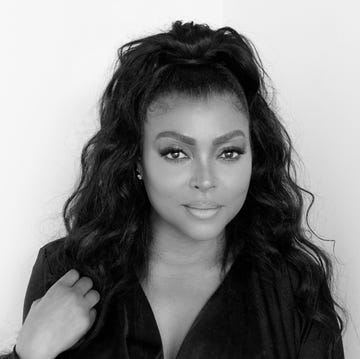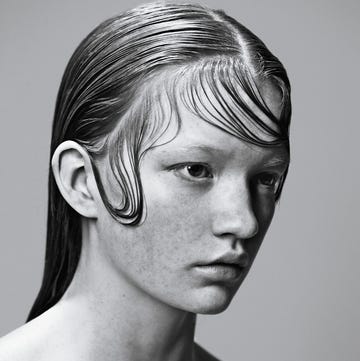Speak up, darling. I cannot hear you," a woman named Goddess prompted me on the telephone. She had no hint of a Jamaican accent, yet I was convinced that she could do for me what no one else could. I cleared my throat and moved to the dining table inside my father's apartment in Long Island where bills were spread out on top of lace doilies—my stepmother's touch.
"Are you interested or not, honey?" Goddess asked, her sweet voice now hardened with an edge of impatience. I pictured her like the Nefertiti of my dreams—standing in a salon on Flatbush Avenue wearing warm reds, oranges, and greens, phone cradled in the nook of her graceful neck, twisting someone else's dreadlocks. I nodded, as if she could see me through the speaker. "How much would it cost?" I asked. She quoted a price that was too high, but I had just enough saved to buy my family gifts for Christmas. I could hear myself breathing. I was about to do the unthinkable.
It was 2001. The twin towers had just fallen. At the same time, a movement called neo-soul was sweeping through the culture like a balmy breeze, as though to ease the nationwide panic; Erykah Badu, Lauryn Hill, and India Arie played on repeat on my Discman. I was home from college during my junior year for winter break. At the local bookstore in Hempstead, I had discovered Dreads, a book by Francesco Mastalia and Alfonse Pagano, documenting pictures and stories of people, including author Alice Walker, who had decided to grow dreadlocks—locs for short. "Bob Marley is the person who taught me to trust the universe enough to respect my hair," Walker says in the book. "I don't even have to close my eyes to see him dancing his shamanic dance onstage, as he sang his 'redemption song'."
I was raised in a household in Kingston where Bob Marley's music was not played; where my older cousin, Kerry—after professing to be Rastafarian—was ostracized from the family, his books about Marcus Garvey thrown out or given away. In Jamaica, Rastafarianism—despite being a religion with a social justice emphasis—was not seen as a religion, but a cult of vagabonds. As a result, Rastafarians were criminalized, constantly stopped and searched by police, their homes raided.
My household reflected the widespread paranoia about Rastas that never seemed to dissipate in Jamaican culture at large—not even when Bob Marley and Peter Tosh put the country on the map with reggae music. Rastafarians were still feared and shunned by our culture. "Nuh get caught up inna dat cult like Kerry," my grandmother warned. She was the most fearful.
And there was no blaming her for that, since she had lived through the horrible massacre of April 11, 1963, when Prime Minister Alexander Bustamante raided the Rasta community of Coral Gardens, Montego Bay. "Bring in all Rastas, dead or alive," he commanded. It was speculated that the order came after retaliation by a handful of Rastas, who were fed up with being violated and who did not want to leave a land that was being primed for tourism. The witch-hunt for Rastafarians on that bloody day—known as "Bad Friday"—resulted in seven Rastas being shot and killed, and many more Rastas injured and detained, their heads shaved. My mother was only six years old, my father only eight. Their own understanding of dread, in every sense of the word, solidified.
Decades later, when I told them about my decision to grow dreadlocks, they each panicked, a world apart. "Yuh want to do what?" My father had just come off a double shift driving a cab, but still his heavy eyelids lifted in disbelief. I needed a ride to Flatbush Avenue to meet Goddess. I'd promised her that I'd be there by noon the next day. I had no idea how to navigate Brooklyn; I never left Hempstead to go anywhere other than Grand Central Station to take the bus back to school in Ithaca. "I just need to get there," I told him. "Why, Nikki?" he asked again, patronizingly calling me by my childhood nickname. "Didn't we raise you bettah than dat?" This would be the first time that I'd ever disappoint my father. "I'm not a Rasta," was all I could say to him. His brows raised. "Where we come from, only Rastas grow dreadlocks. No child of mine g'wan turn Ras, yuh hear?"
"But I'm not a Rasta!" I repeated.
"Therefore yuh have no business growing locs. End ah discussion."
Later that day I called Goddess and tearfully canceled my appointment.
I was in love with Taiwo, one of my housemates in the small, all-female co-op I'd moved into my junior year at Cornell. Taiwo was a year older, and universally beloved because of her involvement in various organizations on campus. But most intriguing to me were Taiwo's long, rope-like dreadlocks, worn down to the middle of her back.
I was embarrassed to admit that although I had grown up in Jamaica, I had never come this close to anyone with dreadlocks. One day, while I was watching television on a study break in the communal living room, Taiwo swooped down the stairs in an African wrap dress, smelling clean, her dreadlocks dripping wet. It was just the two of us. I watched Taiwo dry her hair with a towel, the ropes thicker and lusher than I had ever seen them.
I never knew people washed their dreadlocks. I could still hear my parents calling them dirty and smelly. But Taiwo's hair had the fresh scent of rosemary. One by one she took each loc inside her palm and rolled it, gently, like a potter forming clay on the potter's wheel. "How long have you been growing your locs?" I asked, embarrassed that I was staring for too long and desperately wanting to say something. Taiwo paused as if I had asked a very important question. She gazed up at the ceiling, inhaling deeply. "It was freshman year in high school." Smiling at the memory, she said, "I wanted to be free."
She held out one loc and beckoned for me to touch it. I hesitated, and she guided my hand. To my surprise, her hair did not feel like a rope, but like intricately woven silk: soft and malleable. Emboldened by the ease and comfortable silence, I took more locs into my hands and inhaled the rosemary scent trapped inside the kinks. But there was another smell, too. Something richer, like damp earth after a generous rain. I was in awe of the power, the promise—feeling, for the first time, real desire. By then I had grown tired of chemicals weighing my own hair down; tired of brushing every strand into place, my own identity flattened and straightened under the expectations for a first-generation Caribbean immigrant.
In Taiwo I saw a freedom that I craved.
Five years later, I found my way to a salon in Harlem and began what I would come to know as "baby dreads." To start my locs, the hairdresser in Harlem simply sectioned my short, kinky afro into a cross-hatch of diamond-shaped parts, and meticulously formed coils all over my head with gel and a fine-tooth comb. But I had to wash them out within a week, my head unable to take the itch and flaking from the gel.
A co-worker, Soraya, who also had locs, noticed that I was trying to start mine and offered to wash and re-twist them every month with a pomade that smelled like cocoa butter—not the heavy stuff the first hairdresser used. Instead of coils, Soraya started my locs with two-stranded twists. What I had previously thought a mystery became a visceral reminder of what my great-grandmother, Addy, used to do with my hair when I was a girl. I was amazed by how the two-stranded twists matted by themselves in six months, becoming woven tendrils. Soraya reassured me that growth—the external like the internal—is an individual process, much like life's journey. My dreadlocks started to grow, maturing into a lioness' mane around my shoulders. I felt free.
I came out to my parents shortly after.
The night my mother told me that she'd never speak to me again if I didn't promise her that I could be "changed," I ended up trying to undo a few locs in the back of my head. For some reason I wanted them straight. I wanted everything straight.
Afterwards, I was flooded with regret. What was I doing to myself? In that quiet moment after my rage subsided, I ran my hand through those inches of hair that carried resistance, defeat, victory, disappointment, pleasure, sorrow, happiness, desire. They also carried broken silences, and history.
In the cascading dark dreadlocks, woven as intricately as a quilt, I found myself plaited together, a rounded pattern sprung from my roots.
